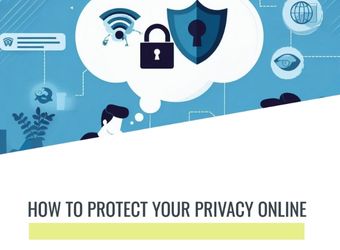Don’t forget to share the article “How to protect your privacy online” on social media. In today’s digital age, where our lives are increasingly intertwined with the internet, safeguarding our online privacy has become a paramount concern. The mere thought of unauthorized entities gaining access to our personal information, browsing habits, and even our location data is enough to send shivers down our spines. But fret not, for there’s a powerful tool at your disposal – the Virtual Private Network or VPN. In this article, we’ll delve into the world of online privacy and explore the importance of using a VPN to shield yourself from prying eyes.
Understanding Online Privacy
Online privacy, often taken for granted, is the cornerstone of a secure and anonymous internet experience. It entails protecting your personal information and digital footprint from the prying eyes of cybercriminals, advertisers, and even government agencies. Your online privacy encompasses your email conversations, search history, location data, and much more. In today’s interconnected world, your data is valuable, and protecting it should be a top priority.
The Threats to Your Online Privacy
Before we delve into the solutions, it’s essential to understand the threats that lurk in the digital shadows. Your online privacy can be compromised by various means:
- Phishing Attacks: Crafty cybercriminals often attempt to trick you into revealing sensitive information through deceptive emails and websites.
- Data Tracking: Advertisers and data brokers track your online behavior, collecting data for targeted advertising and potentially exposing your private interests.
- Data Interception: Unsecured Wi-Fi networks, commonly found in cafes and airports, can expose your data to hackers who intercept unencrypted transmissions.
- Government Surveillance: In some regions, government agencies may monitor your online activities, raising concerns about privacy violations.
Read Also: The Best VPN Top VPN services in 2023
Why VPNs Are Crucial for Safeguarding Online Privacy
A Virtual Private Network (VPN) acts as a shield against these threats, providing a secure tunnel for your internet traffic. Here’s why VPNs are indispensable for preserving your online privacy:
- Encryption: VPNs encrypt your data, rendering it indecipherable to anyone trying to intercept it. This ensures that even if your connection is compromised, your data remains confidential.
- Anonymous Browsing: When you connect to a VPN server, your true IP address is hidden, and you appear to be browsing from the server’s location. This anonymity prevents websites from tracking your real-world location.
- Bypassing Censorship: In regions with internet censorship, VPNs can help you access blocked websites and services, preserving your freedom of information.
- Securing Public Wi-Fi: When you use public Wi-Fi, a VPN encrypts your data, protecting it from potential eavesdropping by malicious actors on the same network.
1. Understanding Online Privacy
Online privacy refers to the control individuals have over their personal information when they use the internet. It involves safeguarding sensitive data from unauthorized access and protecting yourself from various online threats. Understanding online privacy is the first step towards securing it effectively. In this section, we will explore the key concepts and principles of online privacy, such as data privacy, digital footprints, and the importance of keeping personal information confidential.
2. The Importance of Online Privacy
Online privacy is more critical than ever in today’s digital age. This section will highlight why preserving your online privacy matters. We will discuss the potential consequences of a privacy breach, including identity theft, financial loss, and reputational damage. By understanding the significance of online privacy, you’ll be motivated to take proactive steps to protect yourself.
3. Common Online Privacy Threats
To protect your online privacy effectively, you must be aware of the threats you might encounter. This section will delve into common threats such as phishing attacks, malware, data breaches, and tracking cookies. Understanding these threats will help you recognize and avoid them, reducing the risk of falling victim to online privacy breaches.
4. Basic Steps for Online Privacy
Here, we will outline fundamental practices for safeguarding your online privacy. This includes advice on setting strong and unique passwords, enabling two-factor authentication (2FA), and adopting secure browsing habits. These are essential building blocks for your online privacy defense.

5. Choosing Strong Passwords
Passwords are your first line of defense against unauthorized access to your accounts. We’ll discuss how to create and manage strong, complex passwords that are less susceptible to hacking attempts. Additionally, we’ll explore password management tools for convenience and security.
6. Two-Factor Authentication (2FA)
Two-factor authentication adds an extra layer of security to your online accounts. We will explain what 2FA is, why it’s crucial, and how to set it up on various platforms and services. By using 2FA, you can significantly enhance the security of your online accounts.
7. Secure Browsing Practices
Secure browsing involves adopting habits that protect your online privacy. We’ll cover topics such as using HTTPS websites, being cautious with public Wi-Fi, and avoiding suspicious websites. These practices help you minimize the risk of data interception and malicious attacks while browsing the internet.
8. Privacy Settings on Social Media
Social media platforms are a common source of privacy concerns. In this section, we’ll guide you on adjusting privacy settings on popular social media platforms to control what information you share and who can see it.
9. Using Virtual Private Networks (VPNs)
Virtual Private Networks (VPNs) are powerful tools for protecting your online privacy. We’ll explain how VPNs work, why they are essential, and how to choose and use a reliable VPN service. By routing your internet traffic through a VPN, you can mask your IP address and encrypt your data, making it much harder for others to monitor your online activities.
10. Encrypting Your Communication
Communication privacy is vital. This section will discuss the importance of end-to-end encryption for emails, messaging apps, and other communication channels. We’ll provide guidance on using encrypted communication tools to keep your conversations private and secure.
11. Protecting Your Personal Information
Your personal information is valuable to cybercriminals. We’ll explore methods for safeguarding your personal data, including using pseudonyms, minimizing data sharing, and being cautious about what you share online.
12. Safe Online Shopping Practices
Shopping online requires sharing financial information. We’ll share tips for safe online shopping, including using secure payment methods, verifying websites, and recognizing potential shopping scams.
13. Securing Your Mobile Devices
Mobile devices are often a target for privacy breaches. This section will discuss mobile privacy settings, secure app usage, and measures to protect your smartphone or tablet from data leaks.
14. Public Wi-Fi Precautions
Public Wi-Fi networks are notorious for their security vulnerabilities. We’ll provide guidance on safely using public Wi-Fi, including using VPNs, avoiding sensitive transactions, and being cautious about the networks you connect to.
15. Dealing with Phishing Attacks
Phishing attacks aim to trick you into revealing sensitive information. We’ll teach you how to recognize and protect yourself from phishing attempts, including email, SMS, and website-based phishing.
16. Privacy-Focused Web Browsers
Some web browsers prioritize user privacy. We’ll introduce you to privacy-focused browsers and extensions that enhance your online privacy, such as ad-blockers, tracker blockers, and browser settings for enhanced security.
Read Also: Free VPN Proxy
17. Privacy Laws and Regulations
Understanding the legal aspects of online privacy is crucial. We’ll discuss relevant privacy laws and regulations, such as GDPR and CCPA, and how they impact your rights and responsibilities.
18. The Role of Cookies in Privacy
Cookies play a significant role in online tracking. We’ll explain what cookies are, how they work, and how to manage and block them to minimize online tracking and data collection.
19. Privacy Extensions and Tools
There are various browser extensions and privacy tools that can enhance your online privacy. We’ll introduce you to some of the most useful ones, such as password managers, ad-blockers, and privacy-focused search engines.
20. Teaching Online Privacy to Kids
Finally, we’ll address the importance of educating children about online privacy. We’ll provide guidance on how to teach kids about privacy risks, safe internet usage, and responsible online behavior.
FAQ : How to Protect Your Privacy Online
What is online privacy, and why is it important?
Online privacy refers to the control individuals have over their personal information when they use the internet. It's important because it safeguards sensitive data, prevents unauthorized access, and protects you from various online threats, including identity theft and data breaches.
What are some common threats to online privacy?
Common threats to online privacy include phishing attacks, data tracking by advertisers, data interception on public Wi-Fi, government surveillance, and malware that can compromise your personal information.
How can I protect my online privacy?
You can protect your online privacy by using strong, unique passwords, enabling two-factor authentication (2FA), practicing secure browsing habits, adjusting privacy settings on social media, using a Virtual Private Network (VPN), encrypting your communications, and being cautious about sharing personal information online.
What is a VPN, and how does it work?
A Virtual Private Network (VPN) is a tool that encrypts your internet connection and routes it through a secure server, masking your IP address and making your online activities more private and secure. It helps protect your data from eavesdropping and tracking.
Are there any free VPN services available?
Yes, there are free VPN services, but they often come with limitations, such as slower speeds and restricted server locations. Paid VPN services typically offer better performance and more features, making them a more reliable choice for online privacy.
How can I choose the right VPN service for me?
When choosing a VPN service, consider factors like a strict no-logs policy, strong encryption protocols (e.g., AES-256), server locations, speed, and performance. Look for reviews and recommendations to help make an informed decision.
Is using public Wi-Fi safe for online activities?
Public Wi-Fi networks can be vulnerable to data interception. To stay safe on public Wi-Fi, use a VPN to encrypt your connection, avoid sensitive transactions, and be cautious about connecting to unsecured networks.
What is two-factor authentication (2FA), and why is it important?
Two-factor authentication (2FA) adds an extra layer of security to your online accounts by requiring you to provide a second form of verification, typically a code sent to your mobile device. It's important because it makes it much harder for unauthorized users to access your accounts, even if they have your password.
How can I recognize and protect myself from phishing attacks?
Phishing attacks often involve deceptive emails or websites designed to trick you into revealing sensitive information. To protect yourself, be cautious about clicking on links or downloading attachments from unknown sources, verify the sender's identity, and use security software that can identify phishing attempts.
What are some privacy-focused web browsers and extensions?
Privacy-focused web browsers like Mozilla Firefox, Brave, and Tor Browser prioritize user privacy. Additionally, browser extensions like ad-blockers, tracker blockers, and privacy-focused search engines can enhance your online privacy by blocking intrusive trackers and ads.
Conclusion: How to Protect Your Privacy Online
In an era of increasing digital threats, using a VPN is a proactive step towards reclaiming control over your online privacy. By encrypting your data, masking your IP address, and providing anonymity, VPNs serve as your guardians in the virtual realm. So, embrace the power of a VPN, and browse the internet with the confidence that your personal information remains just that—personal. Your online privacy is worth protecting, and a VPN is your armor in the battle for digital freedom. Don’t wait; start securing your online world today.









